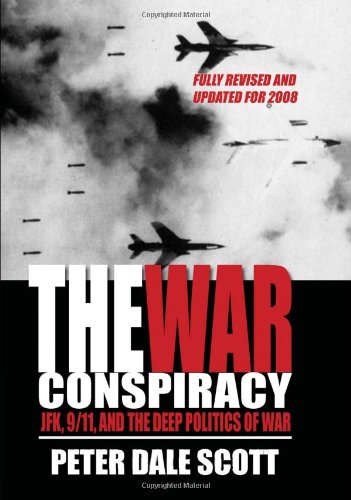If there’s one book I wish President Obama would read over the holidays, it is JFK and the Unspeakable.
Obama, like President John F. Kennedy, has had his first encounters with the permanent warfare establishment, and so far, has been persuaded by their arguments. This book could open his eyes – and ours – to the possibility of another path.
In this eloquent, remarkable book, longtime peace activist and theologian Jim Douglass uses Thomas Merton, a prominent Catholic monk, to elevate the study of Kennedy’s presidency to a spiritual as well as physical battle with the warmongers of his time.
In 1962, as Douglass records in his preface, Merton wrote a friend the following eerily prescient analysis:
“I have little confidence in Kennedy. I think he cannot fully measure up to the magnitude of his task, and lacks creative imagination and the deeper kind of sensitivity that is needed. Too much the Time and Life mentality ….
 JFK and the Unspeakabl...
Best Price: $3.21
Buy New $2.26
(as of 03:25 UTC - Details)
JFK and the Unspeakabl...
Best Price: $3.21
Buy New $2.26
(as of 03:25 UTC - Details)
“What is needed is really not shrewdness or craft, but what the politicians don’t have: depth, humanity and a certain totality of self-forgetfulness and compassion, not just for individuals but for man as a whole: a deeper kind of dedication. Maybe Kennedy will break through into that someday by miracle. But such people are before long marked out for assassination.”
Merton coined the term “the Unspeakable” to describe the forces of evil that seemed to defy description, that took from the planet first Kennedy, then Malcolm X, Martin Luther King, and Robert Kennedy, and which tragically escalated the war in Vietnam.
Merton warned that “Those who are at present too eager to be reconciled with the world at any price must take care not to be reconciled with it under this particular aspect: as the nest of the Unspeakable. This is what too few are willing to see.”
 The War Conspiracy: JF...
Best Price: $12.05
(as of 12:35 UTC - Details)
The War Conspiracy: JF...
Best Price: $12.05
(as of 12:35 UTC - Details)
The Unspeakable represents not only willful evil but the void of an agenda for good, an amorality that, like a black hole, destroys all that would escape from it.
Douglass defines the Cold War version of the Unspeakable as “the void in our government’s covert-action doctrine of ‘plausible deniability,’” that sanctioned assassinations and coups to protect American business interests in the name of defeating communism.
Douglass traces Kennedy’s confrontation with the Unspeakable and his efforts to escape that trajectory. Kennedy came to understand that peace through war would never bring us true peace, but only a “Pax Americana,” which would foster resentment among the conquered, sowing the seeds of future conflicts, a fear that has proven true over and over in the years following his death.
Mea Culpa
Douglass opens with a sort of mea culpa, noting that by failing to see the connection between Kennedy’s assassination and his own personal fight against nuclear weapons, he “contributed to a national climate of denial.”
Douglass explains that the cover-ups of the assassinations of the Sixties was enabled in large part by denial, and not just by the government, but by those of us who never clamored for the truth about what happened.
Douglass reminds us that “The Unspeakable is not far away. It is not somewhere out there, identical with a government that has become foreign to us. The emptiness of the void, the vacuum of responsibility and compassion, is in ourselves. Our citizen denial provides the ground for the government’s doctrine of ‘plausible deniability.’”
Douglass quotes Gandhi on the principle of satyagraha, how truth is the most powerful force on earth, and how, as Gandhi said, “truth is God.” If you want to see God, you must first be able to look truth in the face.
Douglass frames Kennedy’s assassination as rooted in our Cold War past. Our collective failure to demand accountability for the crimes done in our name came back to haunt us in the most visceral of ways on Nov. 22, 1963, when the President was shot dead in the street in front of us.
With astonishing moral clarity and elegant prose, Douglass lays out Kennedy’s multiple battles with the military, industrial and intelligence establishments, which are not really separate entities, but deeply interdependent on each other.
The well-documented (and footnoted and indexed) book opens with a succinct chronology of major events during Kennedy’s administration. Seeing all the events laid out simply, end-to-end, makes the book’s conclusions all the more powerful.
The answer to the question implied in the book’s subtitle of “Why he was killed and why it matters” seems self-evident when you strip away all the false history and distractions that have been injected into the record to muddy the waters and look simply, finally, at what happened.
Douglass takes us back to what may well be the source of John Kennedy’s courage – the sinking of his PT boat and his heartbreakingly difficult but ultimately successful efforts to rescue his comrades. Kennedy faced his own death several times during that first long night, and told his fellow crewmembers when he got back to shore that he’d never prayed so much in his life.
Even after he was safe, Kennedy plunged back into the ocean a second time in an attempt to signal another boat. Kennedy’s utter selflessness was not some liberal fantasy; it was an actuality, for his PT crew.
December 17, 2009




